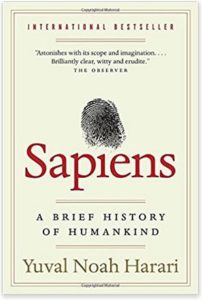I recently finished reading “Sapiens – A Brief History of Humanity”, a fascinating book by Yuval Harari.  Two concepts struck me more intensely in the book:
Two concepts struck me more intensely in the book:
- What determined the supremacy of the human species in the animal kingdom was the capacity for conscious collaboration on a grand scale. This has been so from the first tribal groups to today’s large corporations with hundreds of thousands of collaborators and nations with millions of inhabitants. Bees and ants are also able to collaborate on a large scale, but this does not seem to be a conscious behavior.
- The evolution of human societies was marked by the repeated emergence and subsequent dissolution of myths.
What struck me most in the book was the unfolding of the second concept above, in which the author retrospectively shows the various myths that prevailed throughout history and how they were dissolved with the evolution of Homo Sapiens.
Regarding ancient myths, that’s fine; the explanation flows calmly, in a logical and easy to assimilate way. But when the author begins to analyze the modern times and project the same evolutionary process for the future, that’s when the scenario becomes surprising and intriguing.
Some examples:
In antiquity there was no money. Then it was invented to ease the exchange of diverse goods. There was, then, an intrinsic value attached to money (gold or silver coins, for example). Then came scriptural money, and the correspondence between the declared value of the money and its real value gradually disappeared. The value of money has come to be defined by what people “believe” it is worth. Money is therefore a myth, a collective belief, which prevails until today, after various modifications. The money myth will last for as long as we believe in it.
In antiquity, it was thought that the Earth was flat. This myth was taken for granted. No matter how much one walked on Earth, what was seen was always more flat extensions.
The flat Earth myth fell with the circumnavigation trips. The new myth came to be that of the spherical Earth, as the center of the universe. This myth was taken as an obvious truth, for everybody could see the sun, the moon, and the stars “spinning round the earth.” This myth also fell. And that does not surprise us any more in our current perspective.
Now let’s go to the current myths …
Humans (Sapiens? Humans?) in hundreds, or thousands of years from now, might say: “One of the prevailing myths among the naïve Sapiens of the year 2020 was that death was an inevitable fatality. They did not conceive of the idea that life of the physical body could be extended indefinitely.”
However, there is already scientific evidence today that physical immortality could be achieved in a not too distant future (there are examples in the book of progress in this direction).
Another myth questioned is that of individuality. We consider ourselves to be individual beings, living in communities. But what will happen when we have our brains networked? Today we talk about the “Internet of Things”. Why not accept the idea of an “Internet of Minds”?
There are already hand and arm prostheses connected to the patient’s brain, or to the central nervous system, so that the patient can move the prosthesis only with the electrical impulses generated by the brain in response to thoughts; by the simple intention of moving the prosthetic hand or arm, just as we do with our natural, biological hands and arms.
So why not believe in an “Internet of Minds,” with our brains all connected in a global network of minds. Our knowledge, our sensations, our thoughts (and, why not the feelings?) will all be interconnected in “real time” in a collective database, situated in the “cloud” of a global provider of network services. If / when this happens, what will happen to our present sense of “individuality”? Will it be just another “myth” to disappear?
Those were the ideas in the book that shook me. A lot to think and philosophize about!
Gustavo Monteiro
December 2018

 1-416-561-5780
1-416-561-5780